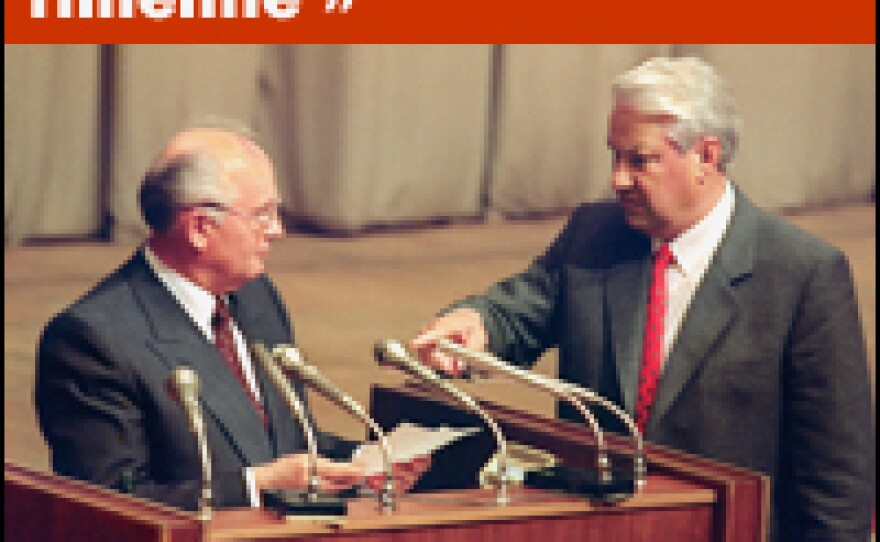

Russian President Vladimir Putin made headlines at a global security conference in Munich in February with a series of unusually pointed comments.
"We are witnessing an almost uncontained, hyper use of force that is plunging the world into an abyss of permanent conflicts," the Russian leader said.
His remarks, aimed at the United States, highlight just how low relations between the two countries have sunk.
President Bush came to office talking tough on Russia and the war in Chechnya. But at one moment back in 2001, he embraced Putin.
"I looked the man in the eye. I found him to be very straightforward and trustworthy. We had a very good dialogue," President Bush said at the time.
The president was asked recently whether the Vladimir Putin who blasted the United States at the Munich gathering was the same Russian leader whom Mr. Bush found to be so trustworthy.
"I think the person who I was referring to in 2001 is the same strong-willed person. He is a person with whom I have had agreements and disagreements," President Bush responded.
From Allies to Adversaries
Of course, the U.S.-Russian relationship is far more complicated than quick sound bites can illustrate. Analysts say there was a reason back in 2001 that President Bush chose to highlight his friendship with Putin.
In order to get out of the anti-ballistic missile treaty and move ahead with U.S. plans for a missile-defense system, the Bush White House needed a pliable Russian leader, says Michael McFaul of Stanford University's Hoover Institution. Before the attacks of Sept. 11, 2001, missile defense was the Bush administration's major initiative.
After Sept. 11, U.S. officials needed Russia's permission to use bases in former Soviet Central Asia, near Afghanistan. There was talk of a real partnership — until differences emerged again over Iraq. That war has overwhelmed the U.S. foreign policy agenda, and McFaul says Washington was missing the big story in Russia.
"The real story of this decade is in the massive redistribution of assets — the transfer of property from so-called oligarchs to friends of Putin," McFaul says. "And that has had detrimental consequences, not only for Russia's democracy and Russian capitalism, but for our relationship as well."
Putin: Expectations vs. Reality
The Bush administration began to reassess Putin. Stephen Sestanovich of the Council on Foreign Relations was among the experts whom the White House consulted.
He says there was no single turning point, but one moment that dramatized how far Putin's performance deviated from Washington's expectations came during the Ukrainian presidential elections.
"The Russian leadership not only backed the fraudulent outcome but invested hugely in preparing for it," Stestanovich says.
Daniel Fried, U.S. assistant secretary of state for Europe, says Russia's pressure on another former Soviet republic, Georgia, also raised eyebrows in Washington.
Moscow's ban on Georgian wine and water imports, the closure of the border between the two countries, and its support for separatist movements within the former Soviet republic are all troubling, says Fried.
"This isn't the sort of behavior we expect from a great power and a good neighbor," he says.
Russia: A 'Center of Contrariness'
Last year, Vice President Dick Cheney came right out and accused Russia of using oil and gas as tools of intimidation and blackmail. But the message was lost on the Russians, according to the Hoover Institution's McFaul, because the next day, Cheney went to Kazakhstan and praised the oil-rich autocratic leader there.
As a result, Cheney's comments about Russia were perceived as illustrating a double standard for Moscow and, more important, there was no follow-up, McFaul says.
President Bush's personal ties with Putin can no longer hide the tensions that are piling up. Sestanovich of the Council on Foreign Affairs says Moscow and Washington aren't heading to some new cold war. Rather, he says Russia is becoming "a center of contrariness."
As the Bush administration faces frustration on issues such as Iran, Darfur and Kosovo, Russia has become uncooperative and a source of opposition.
"It's a chilly kind of unproductive relationship," Sestanovich says.
Gone are the debates about who Putin is, or how to deal with a weak Russia. The State Department's Fried says administration officials are realistic.
He says there is a general sense in Moscow that Russia is strong again, after the troubled 1990s, and that Russian leaders like that newfound strength.
"They like being a player on the world stage," Fried says. "We don't mind them being a player on the world stage. We just want them to be a force for good and responsibility."
For now, that is just wishful thinking on the U.S. side.
Copyright 2022 NPR. To see more, visit https://www.npr.org. 9(MDAzMjM2NDYzMDEyMzc1Njk5NjAxNzY3OQ001))







